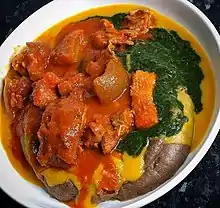Ewedu soup
Ewedu soup is a soup created by the Yoruba ethnic group. It is made from jute leaf, hence it is known as jute leaf soup.[1] Similar to Okra soup, the soup is mucilaginous in texture and is a typical accompaniment to Nigerian beef stew and fish stew. Ewedu soup takes about 12 minutes to prepare and is best served with pounded yam, fufu and Amala. Pluck jute leaf rinse with water and blend, then add crayfish, locust bean also known as iru and salt to give it desired taste. Ensure you do not add too much water, also you can ignore the use ijabe (traditional broom) used to pound and kaun (potash) since you are using a blender.[2]

Preparation of Ewedu soup
You will need the following ingredients to make ewedu soup :
- Fresh jute leaf
- Water
- Locust bean
- Crayfish
- Salt
- Bouillon powder
After plucking a fresh jute leaf, rinse and drain water until there is no more sand in them by packing the leaf leaving remnants of sand and particle inside the water. You can choose to boil the Ewedu leaf until tender to ease blending.[3]
You can result to the use of Ijabe, which is a traditional broom used to pound Ewedu until smooth however a faster and more slimy result can be gotten with the use of blender. Simply pour the jute leaves into blender, add little water to prevent it from been too watery and blend till smooth.[4]
Suitable swallow food
Ewedu soup best goes with fufu, Amala and pounded yam.[5]
Gallery
 Green Jute seed
Green Jute seed Amala with special soup combination
Amala with special soup combination Amala ati Ewedu and Ogunfe
Amala ati Ewedu and Ogunfe
See also
- Ongacious (magazine)
References
- "Ewedu - Jute Leaves Soup". Chef Lola's Kitchen. 2022-03-05. Retrieved 2022-05-19.
- "Ewedu Soup". My Active Kitchen. 2021-05-30. Retrieved 2022-05-19.
- Cuisine, K's (2015-07-16). "Ewedu (How to cook Ewedu Soup that draws)". K's Cuisine. Retrieved 2022-05-19.
- "Ewedu Soup Recipe". Sisi Jemimah. 2015-08-31. Retrieved 2022-05-19.
- "Ewedu Soup". Low Carb Africa. 2020-10-04. Retrieved 2022-05-19.
Further reading
- Modupeoluwa Adekanye (26 July 2019), health benefits of jute leaf, Lagos, Nigeria: The Guardian